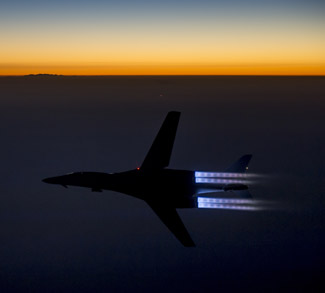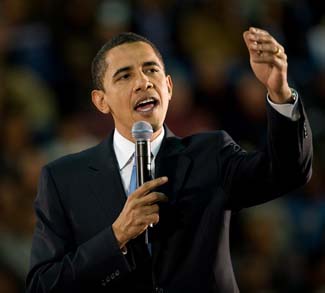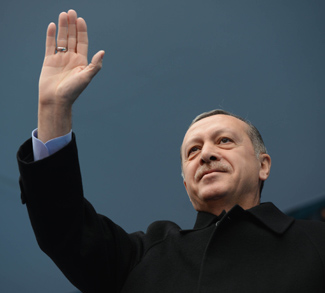President Obama’s plan to destroy Islamic State (IS, former ISIS) is ineffective at best. Rather, NATO allies should aim towards forcing the terrorist organization that is destabilizing the territories of Iraq and Syria to implode from within. Beyond the White House’s valid intentions, there is little solidarity within the coalition that has been assembled to take action. With the exception of the United Kingdom, the United States has not secured any solid assurances from the ‘allies’ forming the ‘Atlantic Alliance’ to back up its overly military-focused strategy; it may even have obtained some rejections. Most of all, the Atlantic Alliance cannot work because it has excluded Syria’s Bashar al-Assad, which is as much an omission as it is a contradiction in terms.
The inception of IS was largely favored by the fact that some of the West’s allies – namely Saudi Arabia and Qatar – have promoted the armed opposition against the regime of President Bashar al-Assad, which, as dictatorial it may be, has yet to find any credible and – reasonable – alternative. Obama’s strategy was conceived and delivered far more to respond to internal pressures from Republicans and ‘hawks’ rather than to actually resolve the IS problem. Perhaps, that is the weakness of his foreign policy. Obama wants to disengage from many international crisis situations but he has been forced to succumb to internal pressure rather than seeking alternative solutions. Meanwhile, the West wants American leadership and it is just getting the same old tired solutions to problems in the Middle East, Ukraine, and China – with which relations have deteriorated.
The fact that President Obama has remained reluctant to intervene militarily in Syria to influence the outcome of the civil war over the past three years suggests that he has realized that working with the Syrian regime offers the only real chance of eradicating IS the terrorist group. Moreover, the Atlantic Alliance is fully aware that the Syrian army, the Kurdish Peshmerga, and units of the Iranian Revolutionary Guard are the ones performing the actual “dirty work” (i.e. combat) on the ground; and this very important latter part is exactly what the allies will not be doing. Meanwhile, inasmuch as Obama has framed the strategy as a war against ISIS rather than against Islam, it will be a difficult sell for some of the Arab governments called to participate. In fact, some of the West’s most reliable regional allies, Jordan and Turkey, will offer only minor logistical support. This is because, IS’s goal of creating a large Islamic state and converting the West are concepts well rooted in the Qur’an and constitutes an attraction for some of the ‘allied’ states. While, none of these would ever engage in messianic wars, their military participation in the anti-ISIS alliance would only serve to exacerbate the conflict within the Islamic world between Sunnis and Shiites. From a strictly military point of view, Obama’s offensive against IS will be largely based on air raids.
Air raids are not sufficient. The problem is not whether to send drones or fighter jets; surely, they will all be used. The issue is that such a conflict as one targeting a well-rooted, armed, and financed militant group as Islamic State, which controls an area the size of the United Kingdom (including Scotland), requires the kind of massive commitment that nobody can assure – not the Americans, and especially not the Arab allies. Obama is promoting a war by half measures and this cannot work. IS has appropriated many armored vehicles, tanks, guns, and ammunition during their numerous raids against the Iraqi and Syrian armies. Yes, the allies can bomb them successfully out in the open using aircraft but the terrorists would then seek refuge in the cities, starting a guerrilla war that can only be addressed with troops on the ground. This is exactly what the rebels have done in Syria, increasing civilian casualties and destruction to property. The West – especially the United States – has little appetite to get involved in such a war again.
No, IS cannot be defeated by air strikes, bombs, and bullets aimed at hitting the infrastructure and the strategic objectives of the organization. Islamic State has enjoyed operational and tactical successes on the ground while it is clear that it has hit an important nerve center in the West, especially the United States and the UK. No war against IS can be won without stopping its rise and its propaganda to recruit members in the West – members who come from Muslim and non-Muslim backgrounds alike. In addition, Western governments should borrow from the anti-Mafia and anti-drug cartel struggles playbook to tackle IS: target its funding and wealth. The military strategy should focus on driving IS away from the oil fields they are controlling. IS also has an actual public administration, provinces, a judicial system, tax collection and, of course, an army, which the CIA has estimated at being over 30,000 troops strong (but according to other estimates it might be as high as 50,000).
In other words, IS should be treated in the same way as a rogue state; it should be made bankrupt and forced to self-implode. Without funds, IS will not be able to provide the kinds of benefits it has promised its backers. It will prove incapable of governing a well-defined territory for quite a long time such that its leadership would emerge discredited beyond repair. The actions proposed by the West, in contrast, may only increase the global popularity of IS.
The Kurds are too few to accomplish a large-scale offensive while the Iraqi army is barely able to defend itself, having no commanders and troops trained to fight a conventional war. The original Iraqi army, especially its best trained forces, was completely dismantled after the Anglo-American invasion in 2003. American instructors have prepared the new Iraqi army as a counter-insurgency force; since the US armed forces left in 2011, they have lacked in proper training. Finally, the Shiite militias that accompany Iraqi troops are better suited to the reprisals that lead to real war. The Gulf monarchies have participated in air raids against Islamic State’s Caliphate – famously, one of the UAE F-16 fighter jet involved in the recent attacks was flown by a woman – but there are questions as to how much show vs. substance there is in the Gulf’s participation in the anti-ISIS raids. ISIS peddles an extreme version of the kind of Islam that dominates the Arab States of the Persian Gulf – Wahhabi Islam. Moreover, pilots from the UAE did not earn an especially brilliant reputation in their last international foray, which occurred during the Libyan war of 2011: some pilots crashed their aircraft upon landing, smashing trucks, while others got lost en route. For one reason or another, Abu Bakr al-Baghdadi does not seem to have anything to fear from any military presence of the Gulf monarchies.
In fact, the only ones who engaged in hard-nosed combat with the troops of the Caliphate are the Syrian military, who have fought against the jihadists for three years, and the Iranian Revolutionary Guards battalions which, this summer, were those most responsible for getting rid of the Caliphate’s militias from the suburbs of Baghdad. Indeed, President Obama’s coalition has deliberately rejected the only countries that have already fought ISIS and the only ones to have defeated it on the battlefield: Iran and Syria. Bashar al-Assad is still considered an enemy. Certainly Washington seems determined to liberate the Iraqi territories, but on closer inspection the presence of the Caliphate in Syrian territory, as opposed to the Assad regime, has never led the international community to mobilize. This is a rather ideological stance on the part of the West and its allies. The Assad regime, in true Machiavellian tradition, knew how to pursue its goals even when it had to take part in unlikely alliances such as joining the international coalition against Iraq in 1990/1991 in Desert Storm. Meanwhile, adopting a rather bewildering military strategy, in order to fight the Islamic State in Syria, Washington and Riyadh are planning to train, in the span of just one year, five thousand militiamen, all “moderates” of course, who would then wage war in Syria. If this sounds rather familiar, it is: the same strategy was used to great effect in Afghanistan in the 1980’s, training the Mujahedin to use American weapons against the Soviets. That strategy gave rise to the Taliban and Osama bin Laden. Moreover, even if such an army can be armed and trained by the Americans and Saudis, what assurances are there that they will not be enticed to join the Caliphate’s army, not to mention the fact that 5,000 militiamen with little motivation, having only light weapons and vehicles, would still be insufficient to retake control of Raqqa and the eastern regions of Syria.
The obstinate policy of excluding Iran and Syria is certainly dictated by Washington’s diplomatic subservience to Saudi Arabia (and Israel). Indeed, mere arithmetic suggests that without the Syrian and Iranian armies, it is impossible to defeat the Caliphate – raising the very question of just how interested Washington and its Arab allies are in dealing with the ISIS problem. British Prime Minister Cameron has better understood the regional implications, meeting Iranian President Hassan Rohani for what are the first direct Anglo-Iranian talks at a high level since the Iranian revolution of 1979. “We disagree on many things,” Cameron said in his speech at the UN.” Iran supports terrorist organizations….but Iran’s leaders can help defeat ISIS and to ensure greater stability in Iraq and Syria.”
How long will it be before the United States does the same? It is rather inevitable.
ISIS has gained considerable strength over the past few months after returning to Iraq, overwhelming the regular troops and stealing heavy military hardware, a good deal of which was supplied by the United States. ISIS has also taken over oil production facilities, robbed banks and grown into a very wealthy organization that has attracted over 15,000 foreign fighters alone. The US military leadership has expressed skepticism over the probability of a swift military victory against ISIS. The two most senior American military officials, Secretary of Defense Chuck Hagel and Chief of Staff Martin Dempsey presented a rather pessimistic report on the Obama administration’s chances of success in the fight against the Islamic Caliphate, listing various obstacles. They expressed doubts about the ability of Iraqi military forces to restore order and to become an effective force against the Islamic State. The military leaders were also concerned about the suggestion to train Syrian armed rebels, who would likely turn their efforts more against the Syrian regime’s forces than ISIS. It should be noted that President al-Assad poses no threat to the West while ISIS could be more dangerous than al-Qaeda itself. Gen. Dempsey suggested that American ground troops may be deployed after all, namely in the guise of advisers on urban combat to the Iraqi army.
ISIS was not born out of thin air. Some regional governments and Western support for the Syrian rebels have helped ISIS grow tremendously. Now, the West and its Middle Eastern allies, Saudi Arabia in particular, will be bombing the geopolitical ‘Frankenstein’ that is ISIS; yet the bombing would not be enough to eradicate it. Iran should have been invited to the international conference held Monday in Paris, because it could play a central role in the fight against the jihadists. Moreover, where ISIS is concerned, it is absurd to accuse the Syrian regime in Damascus for turning a blind eye to the abuses of these jihadists in order to weaken “the moderate rebels.” The fact is that the moderate rebels are a very small minority; many are not so moderate, having several radicals in their midst. Ultimately, the United States and its allies are playing a double game, in one moment claiming to be acting to achieve the Caliphate’s destruction while refusing to cooperate with the States directly concerned by this threat, which include Iran and Syria – among others. There is also another, more insidious problem to the current anti-ISIS strategy. ISIS expresses one of the fastest growing trends of Islam in the Middle East and beyond. ISIS must be fought by the local and regional powers, militarily and ideologically. There is an existential struggle between different strands of Islam in the Middle East today. The United States’ strategy in Iraq and its blind support for Prime Minister al-Maliki infuriated Sunnis in Iraq, paving the way for the rise of ISIS. In Syria, the Shiite domination perhaps paved the way for the Caliphate; however, the Assad regime was strictly secular.
US military intervention against ISIS will anger many Sunnis in Iraq, even the moderates, who feel that excessive Shiite domination in the Iraqi parliament and society have paved the way for the Caliphate. It would be as if the United States intervened to fight the mafia in Italy by bombing Sicily, leaving out any responsibility for Italy itself. ISIS’s menace is now largely directed toward Syria and Iraq. The neighboring states, Saudi Arabia, Turkey and Iran, are the ones for which ISIS is most threatening. The more ISIS advances the more chaos it creates for the regional powers – most of which are too Western dependent. Meanwhile, the House of Saud has financed the war against ISIS as well as the Islamist ideology that has fed it. And the US Air Force has carried out 12 attacks against ISIS oil installations used to illegally extract and trade oil, generating funds of over a million dollars per day.
The Islamic State, finally, is not, as they say, an aberration of Islam; it is Islam in its purest form. ISIS practices an Islam that is most akin to Saudi Salafism. For decades, the ruling family in Saudi Arabia has funded mosques and schools in the Muslim world teaching a puritanical Islam as part of the compromise between the al-Saud family and the Wahhabi religious establishment in the Kingdom. The anti-ISIS strategy as it stands now is a contradictory mess whereby Saudi millions have funded both the rise of ISIS and the Islamist ideology that feeds its ranks and now some of the millions used to fight this very creature, a Frankenstein of sorts. The West is more interested in fighting ISIS as part of a desire to rid Islam of its most radical elements and tendencies. The excesses of the Islamic State have increased tensions between ‘civilizations,’ regardless of how loudly President Obama reassures Washington’s Arab allies that “Islam is a religion of peace” and ISIS is the anti-Islam.
The opinions, beliefs, and viewpoints expressed by the authors are theirs alone and don’t reflect any official position of Geopoliticalmonitor.com.




